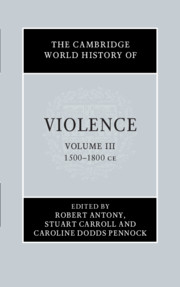Book contents
- The Cambridge World History of Violence
- The Cambridge World History of Violence
- The Cambridge World History of Violence
- Copyright page
- Contents
- Figures
- Maps
- Contributors to Volume iii
- Introduction to Volume iii
- Part I Empire, Race and Ethnicity
- Part II Cultures of War and Violence
- Part III Intimate and Gendered Violence
- Part IV The State, Punishment and Justice
- 17 Crime and Punishment in the Russian Empire
- 18 Homicide and Punishment in Eighteenth-Century China
- 19 Crime and Justice in Anglo-America
- 20 Violence and Justice in Europe: Punishment, Torture and Execution
- 21 Legitimised Violence in Colonial Spanish America
- Part V Popular Protest and Resistance
- Part VI Religious and Sacred Violence
- Part VII Representations and Constructions of Violence
- Index
- References
17 - Crime and Punishment in the Russian Empire
from Part IV - The State, Punishment and Justice
Published online by Cambridge University Press: 13 March 2020
- The Cambridge World History of Violence
- The Cambridge World History of Violence
- The Cambridge World History of Violence
- Copyright page
- Contents
- Figures
- Maps
- Contributors to Volume iii
- Introduction to Volume iii
- Part I Empire, Race and Ethnicity
- Part II Cultures of War and Violence
- Part III Intimate and Gendered Violence
- Part IV The State, Punishment and Justice
- 17 Crime and Punishment in the Russian Empire
- 18 Homicide and Punishment in Eighteenth-Century China
- 19 Crime and Justice in Anglo-America
- 20 Violence and Justice in Europe: Punishment, Torture and Execution
- 21 Legitimised Violence in Colonial Spanish America
- Part V Popular Protest and Resistance
- Part VI Religious and Sacred Violence
- Part VII Representations and Constructions of Violence
- Index
- References
Summary
The chapter explores how, as an ‘empire of difference’, Russia from the sixteenth to the eighteenth centuries tolerated local law for lesser crimes among the empire’s diverse peoples but insisted on the tsar’s law for high crimes (murder, recidivist robbery and theft, treason and heresy and the like). The bureaucracy established a remarkable uniformity of documentary form, judicial procedure and legal norms across the empire. In local courts knowledgeable scribes, in the absence of a professional bar, juridical faculties and notaries advised governors who were untrained amateurs. Lacking jurisprudential expertise, criminal codes were laconic, workaday compendia of fines and penalties primarily intended to police official corruption. Punishment was primarily corporal, but in local courts violence was mitigated by judges’ use of mercy to preserve community stability and by their reliance on locals to staff court and executioners’ roles. Violence, in torture and corporal and capital punishment, escalated in the prosecution of highest crime (treason, heresy), but Muscovy did not conduct European-style theatrical spectacles of suffering until Peter I witnessed them in the 1690s. Even so, from the late 1600s Russia relied increasingly on exile and abolished capital punishment for all crimes but treason by the end of the eighteenth century.
- Type
- Chapter
- Information
- The Cambridge World History of Violence , pp. 331 - 349Publisher: Cambridge University PressPrint publication year: 2020
References
Bibliographic Essay
- 1
- Cited by

